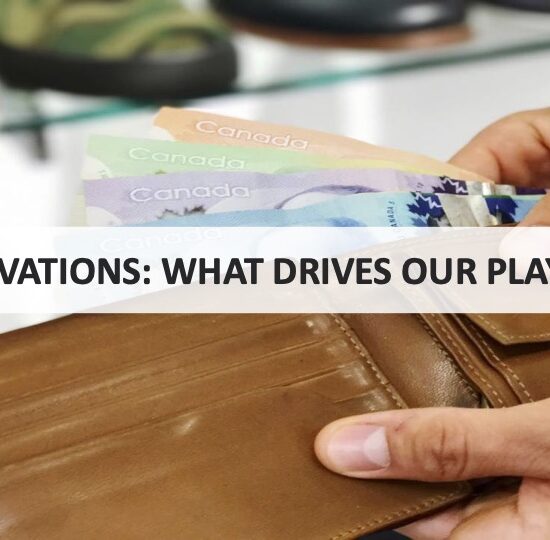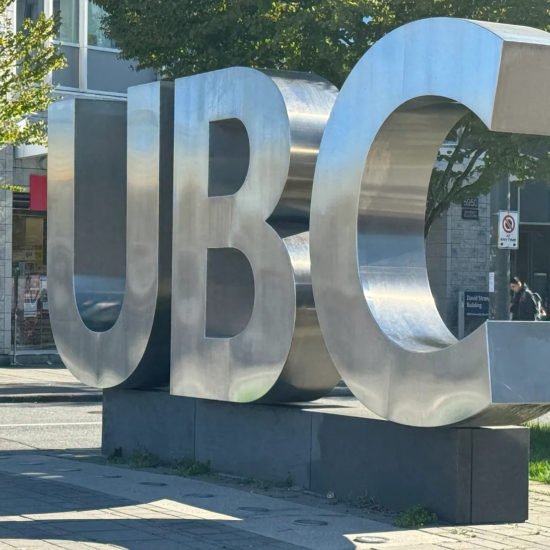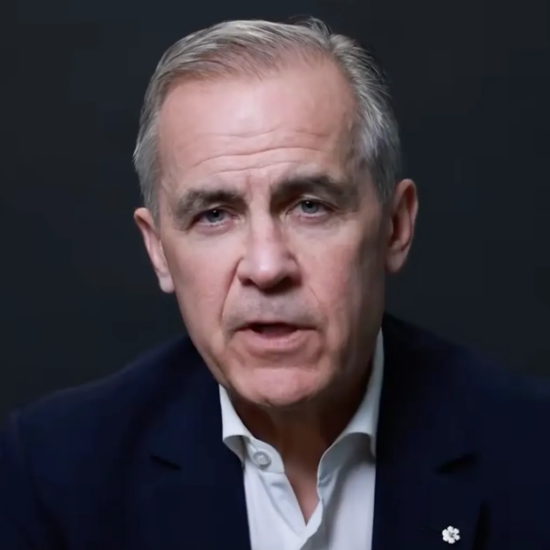
Bob Mackin
One of the lowlights of the 2025 federal election campaign was “Buttongate,” when unnamed Liberal workers planted buttons with gotcha slogans (such as the Trumpesque “stop the steal”) at a Conservative conference. They hoped Pierre Poilievre’s foot soldiers would take the bait and sport controversial slogans.
But it ended up biting the Liberals instead.
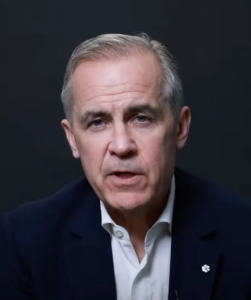
Prime Minister Mark Carney (Liberal/YouTube)
Dirty tricks are nothing new, but tend to reinforce the public perception that political parties are dens of iniquity and the politicians untrustworthy.
Some of the biggest dirty tricks scandals in Canadian political history have British Columbia connections.
Lettergate
In his book “Bill Bennett: A Mandarin’s View,” retired deputy minister Bob Plecas noted that Brenda Dalglish of the Goldstream Gazette originally broke the dirty tricks story in September 1979. The Vancouver Sun followed the next day with a sensational front page headline: Fake letters to editor penned by Socreds.
Quick Wins
The BC Liberal blueprint to use taxpayer-funded resources to pander to ethnic voters in swing ridings to help Christy Clark’s party win the 2013 election. BC Liberal operative Brian Bonney was sentenced to nine months house arrest in 2018 for breach of public trust.
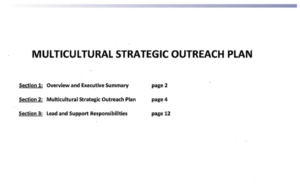 Fake phone calls
Fake phone calls
Court documents identified Bonney as “Brian from Burnaby,” who boasted to party workers about his skills at calling radio talkshows. He also recruited party members to sign their names to letters to newspaper editors that promoted the governing party and bashed the opposition NDP.
Lobbyist Steve Kukucha and Mike McDonald, Clark’s first and last chief of staff, were also in on the scheme, which recalled the 2005 “Peter from Surrey” scandal. Indo-Canadian community organizer Prem Vinning was exposed after calling a Channel M talkshow to pose softball questions to Premier Gordon Campbell. He eventually resigned as Campbell’s director of Asia-Pacific trade.
“Warren Betanko”
One of the most-notorious dirty tricks in B.C. history was in 1998, when Parksville-Qualicum MLA Paul Reitsma was booted from caucus after writing letters in praise of himself to a local newspaper under the monicker “Warren Betanko.”
The Parksville Morning Sun revealed the deception when it published a story under the headline “MLA Reitsma is a liar and we can prove it.”
“Allan Whitterstone”
A member of the NDP-aligned Community First New West school board caucus set up a fake account, according to a whistleblower, “to harass parents, teachers, and even the head of the BCTF for years.”
Dee Beattie eventually admitted to she was using the account, blamed mental health issues and stepped down.
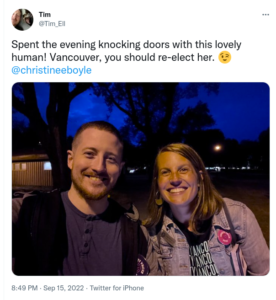
Tim Ell (left) and Christine Boyle (Twitter)
AggregateiQ
A Victoria political agency played a role in the Facebook/Cambridge Analytica.
British Columbia and Canada’s privacy watchdogs found Aggregate IQ broke privacy laws, but was not fined due to the weakness of those laws. The company failed to gain consent for the collection, use or disclosure of personal information when it worked for SCL Group, the Vote Leave Campaign in the Brexit referendum and on provincial and municipal campaigns in B.C.
Jeff Silvester and Zack Massingham started the company in 2013. Massingham had worked on Mike de Jong’s 2011 BC Liberal leadership campaign. Silvester, a former aide to Liberal and Reform MP Keith Martin.
OneCity’s chat log
The NDP-aligned civic party in Vancouver plotted to attack housing affordability activist Rohana Rezel, who ran for the ProVancouver party in 2018.
One of those on the chat, Tim Ell, proposed “we give [Rezel] a taste of his own medicine and openly wonder why he’s associating on Twitter with possible pedophiles.” Ell later apologized.
Another person, whose identity was redacted on Rezel’s website, suggested “someone should just create anon (account) that spews nonstop racist misogynist stuff and then pin it on Rezel.”
“They tried to destroy my life and they spread some horrendous, malicious rumours about other people,” Rezel said in an interview. “They need to beg everyone involved for an apology. But no one’s taking accountability.”
TruAnon

Tom Pitfield (left) and Braeden Caley at the 2024 Democratic National Convention (X/Pitfield)
The social media savvy Liberals caught the eye of one of CNN’s top anchors in 2021. Jake Tapper likened Liberal Twitter to the cult-like QAnon followers of Donald Trump, after interviewing Justin Trudeau and hearing from his hyperpartisan, diehard fans.
“Careful for acknowledging facts or Tru-Anon will attack you,” Tapper Tweeted on April 14, 2021.
Trudeau and the Liberals set the standard for social media use in Canadian politics. The architect is Tom Pitfield, whose Data Sciences Inc. firm came under the microscope before the 2021 election. Federal ethics commissioner Mario Dion ruled that Trudeau was not involved in giving DSI taxpayer contracts.
The Liberal Research Bureau had a contract with DSI, the Canadian provider of the U.S.-based NGP VAN Inc. software behind the Liberalist party database.
Pitfield is more than a digital guru this time. He is the executive campaign director and chief strategist for Carney.
Columnist Eric Blais, under the headline “A rare look inside the Trudeau Liberals’ black box,” profiled Pitfield’s company: “Data Sciences knows the party from every angle: it manages its database, tracks its funding, monitors whether its candidates are preparing their constituencies for the electoral meeting, targets potential voters on social networks and refines its digital advertising.”
The B.C. angle?
Strategic Communications is the B.C. NDP’s longtime polling and data “brain.” But, last fall, David Eby’s party paid DSI $12,302.85 to help get re-elected against John Rustad’s Conservatives.
NEW: Subscribe to theBreaker.news on Substack. Find out how: Click here.






